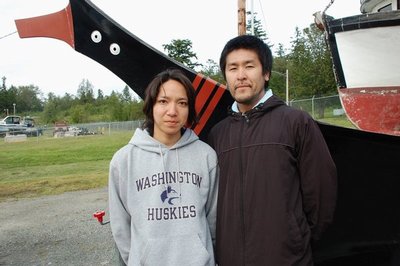July 8, 2010
Indigenous communities from across the Pacific join for first-ever cultural collaboration
In the culminating event of a yearlong cultural exchange between the indigenous Ainu community of Japan and several Washington State tribal groups, a group of Ainu paddlers will join The Tulalip Tribes in the annual Tribal Canoe Journey event, this year hosted by The Makah Nation.
The Ainu will travel the farthest distance of any group to participate in this year’s Tribal Canoe Journey. In 2008 the Ainu were formally recognized by Japan’s government as the nation’s “first peoples.” Similar to Northwest Coast indigenous communities, canoes have long played an important part in the lifestyle and livelihood of the Ainu. The Ainu are currently undergoing a major cultural revival and participation in the Tribal Canoe Journey offers the opportunity to reconnect with long-held canoe paddling traditions.
Since fall 2009, the Burke Museum at the UW has been leading the cultural exchange between the Ainu Association of Hokkaido and six tribal groups in Washington: The Duwamish Tribe, The Makah Nation, The Suquamish Tribe, The Squaxin Island Tribe, The Tulalip Tribes, and The House of Welcome Long House at Evergreen State College. The exchange has given these communities the opportunity to share their histories and heritage and to participate in a dialogue about common issues shared by indigenous peoples on both ends of the Pacific.
Two Ainu interns, Masashi Kawakami and Akira Kikuchi, have spent the past eight weeks in Seattle, creating an exhibit and a study kit about Ainu culture for the Burke. Kawakami and Kikuchi will be part of the Ainu delegation to participate in the Canoe Journey.
The Tribal Canoe Journey is an annual event that celebrates the thriving canoe culture among Native communities along the Pacific Northwest Coast. Each year, a different nation hosts the event and thousands of people make the journey from their home to the host nation by way of ocean canoe. The Makah Nation, located at Neah Bay on the Olympic Peninsula, is hosting the 2010 Canoe Journey.
Starting in early July, over 100 canoes representing about 40 indigenous groups from Washington, Oregon, British Columbia, California, Hawaii, and New Zealand will begin their trip from their home bases to Neah Bay. Each group of paddlers will coordinate their trip to arrive at Neah Bay on Monday, July 19. From July 19 to 24, each tribe will take turns sharing their songs, dances, and stories.
The Ainu Association of Hokkaido will send eight paddlers to participate in the Canoe Journey. The week of July 12, the Ainu paddlers will join members of the Tulalip Tribes and other host communities as they launch a canoe from Suquamish, Wash. The group will paddle north through the Puget Sound and Strait of Juan de Fuca on their way to Neah Bay, stopping at designated camp sites along the way to eat and sleep. Upon arrival at Neah Bay, the Ainu will be the first group to present their heritage to the other groups, as they will have traveled the farthest to participate in the Canoe Journey.
Support for this exchange has been provided by the Museums & Communities Collaboration Abroad, which is a program of the Bureau of Educational and Cultural Affairs of the US Department of State in partnership with the American Association of Museums.



